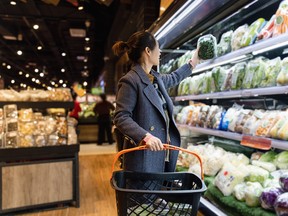‘You’ll see many products being more expensive in the grocery store. And, once the tax actually comes back, it will be slapped on higher food prices,’ says Sylvain Charlebois

As retailers gear up for the federal government’s holiday tax break, consumers are worried grocers may jack up prices, eliminating any savings, according to Sylvain Charlebois, senior director of Dalhousie University’s Agri-Foods Analytics Lab.
Recommended Videos
“Food retailing is a game of pennies, so they’ll grab every penny they can,” Charlebois said. “If they can raise the price of other products, they will.”
Many groceries are already tax free but the federal government will exempt the goods and service tax (GST) — or harmonized sales tax in some provinces (HST) — on additional items starting Dec. 14.
The two-month tax holiday, proposed under Bill C-78, will also exempt taxes on restaurant meals, newspapers and books, children’s products, christmas trees and other holiday essentials until Feb. 15 of 2025.
“Our government can’t set prices, but we can give Canadians, and especially working Canadians, more money back in their pocket,” Prime Minister Justin Trudeau said on Nov. 21. “With a tax break for all Canadians …. we’re making sure you can buy the things you need and save for the things you want.”
While the new policy appears to be a gift for consumers this holiday season, the concern lies in whether or not some retailers could subtly increase food prices on items included in the tax break. This would mean that retailers benefit while consumers pay the same price.
“On the surface, the GST rebate may seem as a good-willed gesture on behalf of Ottawa,” Charlebois said. “But the temporary nature of the policy is likely going to negatively impact Canadians.”
The policy could spark additional inflationary pressures at a time when, as Minister of Finance Chrystia Freeland says, “expenses are highest for many Canadians and their families — even with inflation back down to two per cent and interest rates being cut four times this year.”
Charlebois said that the tax break could cause a disruption in pricing strategies. This would encourage grocers to adjust prices to compensate for the two-month break, causing overall food prices to increase after the tax holiday ends.
“It’s like the tide: If some products become more expensive, everything else becomes more expensive,” Charlebois said. “So, the argument that only taxable products are going to be impacted is inherently flawed.”
Charlebois said that the “poisonous nature” of the tax break is that it is temporary.
“By the time we get to February, you’ll see many products being more expensive in the grocery store. And, once the tax actually comes back, it will be slapped on higher food prices.”
This is happening at a time when food prices are already predicted to increase by between three and five per cent in 2025, according to Canada’s Food Price Report 2025.
While the GST/HST relief may temporarily give Canadians a break, Charlebois thinks taxing food, in general, is ineffective and regressive. And, with additional inflationary pressures ahead, it will further disproportionately penalize households that rely on lower-cost items, such as prepared foods, which are not usually tax-free, while fresh items are.
Charlebois said it would be more worthwhile to permanently exempt taxes on all grocery foods for Canadians.
The New Democrats (NDP) have proposed this very motion: a permanent elimination of taxes on all grocery store food items. It’s a proposal worth “serious consideration” according to Charlebois.
The tax break “is an opportunity for the government to have a very important conversation about whether or not we should be taxing food at all.”
Our website is the place for the latest breaking news, exclusive scoops, longreads and provocative commentary. Please bookmark nationalpost.com and sign up for our daily newsletter, Posted, here.